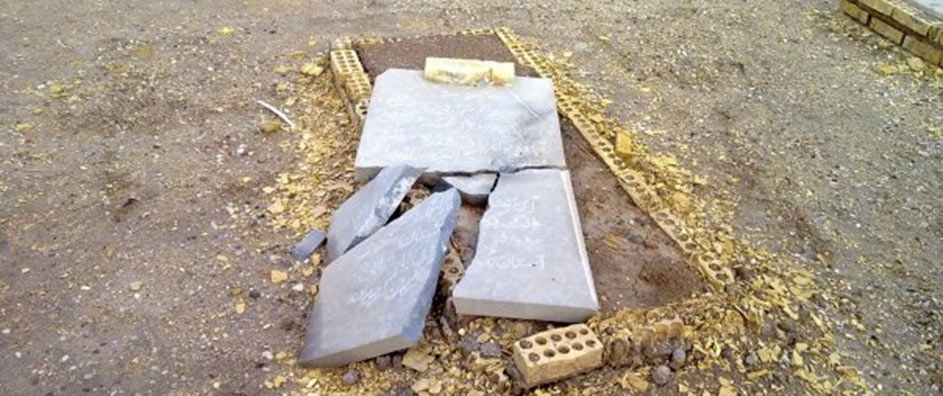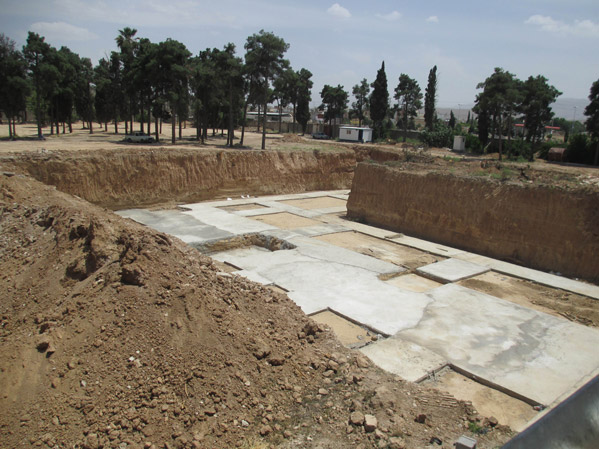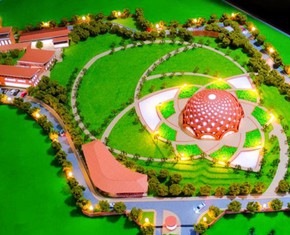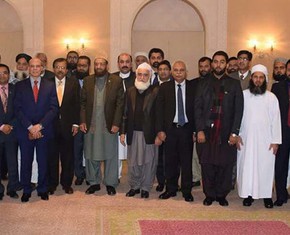The views expressed in our content reflect individual perspectives and do not represent the authoritative views of the Baha'i Faith.
O people of Persia! How long will you wander? How long must your confusion last? How long will it go on, this conflict of opinions, this useless antagonism, this ignorance, this refusal to think? Others are alert, and we sleep our dreamless sleep. – Abdu’l-Baha, The Secret of Divine Civilization, p. 11.
After the Iranian revolution in 1979, and the initial theft by the Iranian government of the Baha’i community’s bank accounts, the next few months witnessed the ongoing government seizure of the assets and properties of local Baha’i communities around the country, including local meeting halls and administrative offices.
Then, once those properties had all been seized, the government began to confiscate and bulldoze Baha’i cemeteries. Iran has no civic cemeteries; all burials occur on land that belongs to a particular religious community, which means the Baha’i community had to acquire its own cemeteries. The seizure of those Baha’i properties continues up to the present day. From time to time, the local authorities will confiscate, bulldoze and destroy a Baha’i cemetery, forcing the community to buy another one.
In fact, in August of 2014 Iran’s Revolutionary Guards Corps (IGRC) continued its demolition of the historic Baha’i cemetery in Shiraz–where the ten Baha’i women hanged by the regime in 1983 had been buried. After the IGRC stopped their demolition for several months because of international pressure, they resumed in August by removing the human remains of between 30-50 Baha’is, and throwing those remains into an open canal nearby, ostensibly to clear the land for “the creation of a new cultural and sports complex.”
These seizures of funds, property, buildings and cemeteries began in 1979, and they continue today.
The Iranian government banned all Baha’i administrative and community institutions in a decree issued by the Attorney-General on 29 August 1983. In accordance with the Baha’i principle of obedience to government, the Baha’is obeyed the decree and disbanded the national and the more than 400 local administrative bodies of the Baha’i community. Since the functions of these democratic Baha’i institutions included supporting the poor, the disabled and the incapacitated, this governmental action removed a major support for those Baha’is increasingly affected financially by government measures.
After stealing the communally-owned funds, assets and property of the Baha’i community, the Islamic Republic’s government then began to put pressure on individual Baha’is, insisting that they recant their Faith, and then placing them under financial stress by expelling them from employment.
Just as they did in Nazi Germany, the expulsions from employment started with the sector over which the government had the greatest and most immediate control–the public sector.
Up until the time of the Islamic revolution in Iran, a large number of Iranian Baha’is served in public-sector employment. Since the Baha’i Faith emphasizes the importance of education, a sizeable proportion of the Baha’i community worked in professions requiring high levels of education. Also, Baha’is often tend to enter certain areas of public service such as health and education, in view of what the Baha’i teachings say about these professions and their potential for service to humanity.
At first, the Iranian government put Baha’i public employees under pressure to leave their religion. If they refused to recant, their employers fired them. This practice began in 1980, when government officials in all parts of Iran, acting on their own initiative, began sporadic expulsions of Baha’is employed in the public sector, no doubt hoping to gain favor with the new Islamic government.
As one example, the newspaper Etela’at, on 18 February 1980, reported 50 Baha’i teachers expelled in just a single Iranian province, Eastern Azerbaijan. The newspaper Jumhúr-i Islami, on 30 June 1980, reported the expulsion of 44 teachers in Fars province. The Kayhan newspaper, on 9 August 1980, reported the expulsion of 23 Baha’i teachers in the south coast province for “having beliefs contrary to Islam.” Similarly, the government expelled Baha’is en masse from positions in universities, government hospitals, government offices, museums, etc. In many cases the documents given to individuals declaring their expulsion contained provisions that offer re-employment if they recant their beliefs.
Then, in an almost exact echo of the Nazi Jewish expulsion laws of 1933, the Iranian government issued a formal decree on 7 December 1981, and published it in the semi-official newspaper Kayhan on 8 December 1981, declaring the expulsion of every Baha’i from all government employment as official government policy.
By July of 1982, the Baha’i community reported that the Iranian government had terminated all Baha’i doctors, nurses, teachers and other government employees. Even the pensions of former Baha’i civil servants had stopped. No one knows exactly how many Baha’is were dismissed from their employment in this way, but the Baha’i International Community (the agency which represents the global Baha’i community at the United Nations) estimates that the number of Baha’is expelled from their employment during the 1980s at approximately 10,000 people. Since the Islamic revolution effectively nationalized the provision of all health and education, the Baha’is had little prospect of finding alternative employment.
Announcing the expulsion of all Baha’is from public employment, Ayatollah Saduqi threatened criminal proceedings against any official continuing to employ a Baha’i. This edict didn’t just affect Baha’i doctors and educators—the government’s actions also denied Baha’i peasant farmers access to the government-sponsored farmers’ co-operatives, their only source of credit, seed, pesticide and fertilizer.
In a bizarre turn in 1984, the Islamic clergy and courts also decreed that the Islamic government should not have paid any salaries to Baha’i employees–and therefore all “illegal” salaries and pensions paid to such former employees had to be repaid by them, even if it involved decades of earnings amounting to large sums of money that no ordinary citizen could afford. The Attorney General then attempted to enforce this decree by issuing summonses against former Baha’i civil servants. Since most Baha’is could not repay such large sums, this led to a large increase in the number of Baha’is in prison in the 1980s.

















Comments
Sign in or create an account
Continue with Googleor